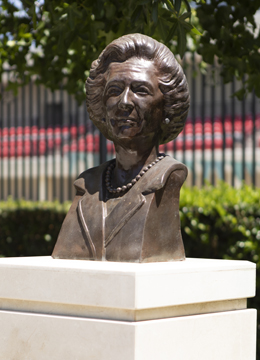- Margaret Thatcher
Critical Essay By
Dr. Deepa Badrinarayana
Professor
Fowler School of Law
View Bio
There are generally different reasons to commemorate a leader by commissioning the creation of their bust. Few leaders have achieved a universal appeal that warrant such recognition. Since human experiences and beliefs vary, it is hard to establish objective criteria to assess the remembrance-worthiness of a leader, unless, perhaps, the society has largely rejected the core ideology that defined their leadership and contribution. So, it is only by a careful examination of the overall contribution of a leader, inevitably informed by one’s own personal experience and tempered by thoughtful objectivity, that one can determine an individual’s bust-worthiness. Where does Mrs. Thatcher, three-term Prime Minister of the United Kingdom, a rather controversial figure even during her time, yet firmly etched in annals of world history as the Iron Lady, stand?
Margaret Thatcher first became Prime Minister of England in 1979. At that time, she was one of extremely few women elected to the highest office of a nation. The first in her own country. Even to date, few women share that distinction. What’s more, Margaret Thatcher did not emerge as a leader from the ranks of Britain’s elite class, with easy access to power and political clout. Although a graduate of Oxford University with a degree in chemistry, Mrs. Thatcher was born to a Methodist shopkeeper and his homemaker wife, steeped in an ethos of hard work. Her upbringing resonated in her policies and resolute leadership style. Her rise to the top echelons of British politics was neither an accident, nor a concession. By dint of hard work and resolve, Mrs. Thatcher proved that the proverbial glass ceiling could indeed be shattered.
What Mrs. Thatcher set out to achieve, however, was not to shatter the glass ceiling, but rather address the economic apathy Britain was sinking into, as its competitiveness flagged. During her three terms as Prime Minister, Margaret Thatcher structurally changed the course of British economic policy and set the stage for global economic liberalization that would follow the end of the Cold War. To many, she returned England its pride and glory. The ruins of rusty, muddied and gutted Albion were reinstated as a financial powerhouse, carried on the shoulders of privatized institutions.
The Britain that Mrs. Thatcher took reins of was steeped in high inflation levels, unemployment, and debt. To counter these challenges, Mrs. Thatcher overrode the post-War Keynesian consensus and veered Britain towards a free market economy, with the dual goals of reducing inflation and budget deficits. Denationalization also meant reigning in socialist inspired institutions such as trade unions. Her goal was to reverse budget deficits, increase employment and foster individual economic freedom. Economic liberty to her was quintessential to liberty itself. That liberty warranted creating opportunities for individuals, providing tax breaks, and generally weaning Britons of government sponsored programs such as housing and food subsidies.
Focusing on the supply side, Thatcherism, as her economic policy came to be defined, embodied the belief that economic liberty would yield individual success which, in turn, would catalyze industrial production, financial independence, thus leading to reduced dependency on the government and thereby reduce government spending and deficit, while simultaneously increasing British competitiveness and prosperity. As with many government policies, Thatcherism, too, faced resistance. Even as the she began implementing economic liberalization and privatization, opposition mounted, most famously with miners striking during her second term. Indeed, some members even in her own Conservative party rolled back their support for Thatcher’s fast-moving changes to economic policy. Refusing to back down, Thatcher resolved to implement her economic policies with even more vigor. The results were mixed, and the jury is still out on these policies. However, Thatcherism cannot be conflated with economic liberalization and privatization all the way, for Mrs. Thatcher made an important exception to her policy—retaining the National Health Service (“NHS”). Although she warned against over-spending tax payer’s money, she retained government control over access to health care. This reflects her pragmatism in that a healthy society is critical to the economic output of individuals, and thus, eventually to the economic health of a nation.
Mrs. Thatcher’s foreign policy is a mixed bag, even though service in the British Empire was her childhood ambition. Her singular undisputed achievement remains Britain’s victory in the Falkland wars. Ironically, despite signing the Single European Act, Mrs. Thatcher remained ambivalent about a European federalism project, instead maintaining a strong relationship with the United States—indeed, she maintained a notably strong friendship with then - U.S. President Ronald Reagan. Although she held out much hope for strengthening ties with former Soviet states, with support from Mikael Gorbachev, much of it did not come to pass. More controversially, Mrs. Thatcher rejected the imposition of economic sanctions on South Africa in opposition to their practice of apartheid, labeling the African National Congress (“ANC”) independence movement a terrorist organization. Her position on these issues was rooted in economic philosophy—of not imposing restrictions on free trade, and not a philosophical rejection of the ANC’s cause. This is evident in her granting diplomatic protection to the ANC and providing armed protection to senior ANC officials in London. What stands out, however, is her steadfast refusal to impose economic sanctions, because of her belief that economic sanctions would worsen the situation rather than improve them, even though this was never proven.
Tomes have been written on Margaret Thatcher. They collectively speak to the scale of her achievements. Whether Mrs. Thatcher should be universally commemorated for three terms of enduring service to Great Britain and to the ideology of economic liberty—that will also be the foundation of post-Brexit Britain—or whether her singular commitment to economic liberty above nearly everything else warrants a rejection of her commemoration remains an elusive matter. Mrs. Thatcher herself may well prefer each individual to make up their own minds.
